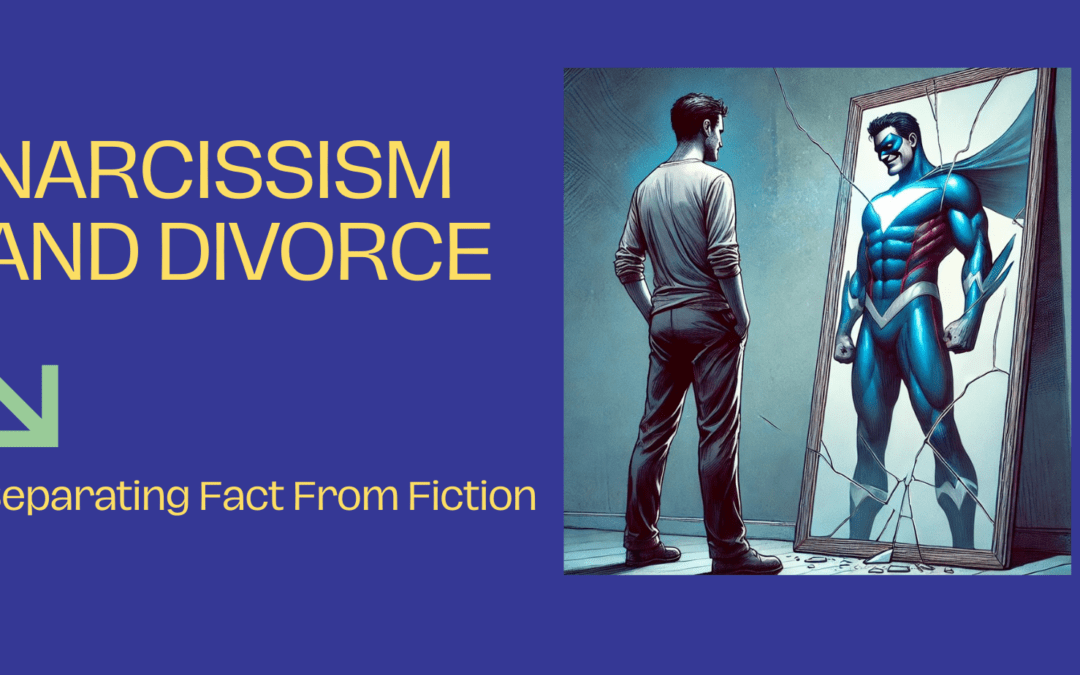When it comes to narcissism and divorce, the term “narcissist” gets thrown around a lot. Many people believe they’re divorcing a narcissist, and this may indeed be the case. If you feel that your spouse is a narcissist, it’s important to acknowledge that your experiences and feelings are valid.
Narcissistic behavior can be deeply harmful, even leading to emotional abuse and financial abuse. Our goal is not to downplay your situation but to help you navigate it with the best possible outcome in mind for you and any children involved.
However, it’s also important to recognize that the term “narcissism” is often used loosely and can be a distraction in the legal process.
Understanding the myths and realities surrounding narcissism and divorce is crucial for making informed decisions and managing expectations. By focusing on practical strategies and separating fact from fiction, we aim to provide you with the guidance you need to move forward effectively and safely.
Understanding Narcissism
The Diagnostic and Statistical Manual of Mental Disorders describes Narcissistic Personality Disorder (NPD) as a mental health condition characterized by a long-term inflated sense of self-importance, a need for excessive attention and admiration, and a lack of empathy for others. Despite its high profile in popular discussions, NPD is relatively rare, affecting only about 1% of the population. Yet, the label “narcissist” is frequently used without a proper understanding of what it actually means.
In everyday conversations, the term “narcissist” is often used loosely to describe anyone who appears self-centered, arrogant, or manipulative.
In romantic relationships, people with narcissistic tendencies may initially come on strong with compliments and declarations of love but later become critical or start gaslighting their partner. They may also have a need for constant validation of their superiority. However, it’s important to remember that exhibiting narcissistic tendencies does not necessarily mean someone is a narcissist in the clinical sense.
Focusing on psycho-analyzing your partner during a divorce can be counter-productive. It can lead to increased rancor and conflict, resulting in a more contentious divorce. This not only benefits the attorneys, who may end up with a larger portion of the overall financial settlement, but it can also cause significant emotional and psychological damage to everyone involved, including the children.
If you are divorcing a narcissistic person, it’s best to avoid unnecessary conflict to achieve the best possible outcome holistically and to move on with your life.
This doesn’t mean becoming a doormat or avoiding necessary confrontations; rather, it’s about keeping the North Star in mind and avoiding being pulled off course. By staying focused and strategic, you can navigate the complexities of divorce more effectively and ensure the best possible outcome for yourself and any children involved.
Common Myths about Narcissism and Divorce
Misunderstandings about narcissism can complicate divorce proceedings and lead to unnecessary conflict. It’s essential to separate fact from fiction to navigate the process effectively. Here are some of the most common myths about narcissism and divorce, and the realities behind them:
Myth: Narcissistic Behavior Means Your Spouse is a Narcissist
One of the most prevalent myths is the assumption that a difficult or unkind spouse must be a narcissist. However, many behaviors that cause marital strife can arise from a variety of issues, not just NPD. Labeling a spouse as a narcissist without a clinical diagnosis can oversimplify complex relationship dynamics.
Myth: Defining Your Spouse as a Narcissist Will Help Your Case
Some believe that accusing their spouse of being a narcissist will somehow benefit them in court or during settlement negotiations. The reality is, even if you are divorcing a narcissist, it has very little to no impact on the outcome of your case.
The courts typically focus on tangible, legal factors when determining the outcome of a divorce, such as:
- Division of Assets and Debts: The court looks at what assets and debts each party has and divides them equitably, not necessarily equally.
- Child Custody and Child Support: Decisions are based on the best interests of the child, including factors like stability, parenting abilities, and the child’s needs.
- Spousal Support: Also known as alimony, this is based on the length of the marriage, each party’s financial situation, and their ability to support themselves.
Personal characteristics, such as whether someone is a narcissist, generally don’t impact these decisions unless their behavior directly affects these areas. For example, if a spouse’s narcissistic behavior can be proven to negatively impact the children, it might influence custody decisions. However, simply labeling someone a narcissist isn’t enough; concrete evidence of harmful behavior is required.
The courts prioritize facts and evidence over personality assessments.
Myth: Divorce Attorneys and Divorce Coaches Are Qualified to Diagnose Narcissism
Aggressive divorce attorneys and coaches might use the term “narcissist” as a buzzword to attract clients. However, diagnosing NPD is a complex process that should be left to qualified mental health professionals.
Relying on legal professionals for psychological evaluations can lead to misunderstandings, misguided strategies, and expensive litigation. This approach can also result in the use of children as pawns, an egotistical struggle for power and control, and the excessive enrichment of the attorneys at the expense of the divorcing parties.
Myth: It’s Impossible to Have an Amicable Divorce with a Narcissist
While it can be more challenging, it is not impossible to have an amicable divorce with a narcissist. Understanding what motivates the individual and using strategic communication can sometimes lead to more peaceful resolutions. More on that later.
Divorcing a Narcissist – Reality Check
Aggressive family law attorneys and coaches often perpetuate these myths, contributing to misinformation and unnecessary conflict. They leverage the term “narcissist” because it’s a powerful, emotionally charged word that can draw people in. However, this approach can lead to skewed perceptions and unproductive legal strategies.
Ironically, this persuasion tactic can be seen as somewhat “narcissistic” itself. By inflating their clients’ concerns and making the divorce more contentious, these attorneys often end up with a larger piece of the financial pie. This is done at the expense of their clients’ financial and emotional health, leading to prolonged and more painful divorce proceedings.
By inflating their clients’ concerns and making the divorce more contentious, these attorneys often end up with a larger piece of the financial pie.
In reality, the reasons behind high-conflict divorces are varied and multifaceted. While narcissistic traits can contribute to marital problems, they are not the sole factor. It’s important to focus on tangible issues and evidence rather than getting sidetracked by potentially inaccurate labels.
Amicable Divorce with a Narcissist – Is it Possible?

In dealing with a narcissist during divorce, you must play the hand you’ve been dealt. You can’t change the past or the cards in your hand, but you can strategize to make the best play possible with what you have.
Narcissists thrive on conflict, attention, and the perception of winning. Understanding this is crucial to navigating the divorce process effectively. As Sun Tzu said in The Art of War, “If you know the enemy and know yourself, you need not fear the result of a hundred battles.”
Achieving an amicable divorce with a narcissist requires understanding their motivations and carefully managing interactions. Some narcissists are driven by financial concerns and might opt for a low-conflict resolution to avoid costly legal fees. Others care deeply about their public image and may prefer to settle matters quietly to avoid damaging their reputation. By strategically framing divorce terms to align with the narcissist’s motivations one can often negotiate a more favorable settlement while minimizing conflict.
Here are some strategies for cases involving narcissists:
- Understand their motivations: Tailor your approach based on what they value most.
- Use strategic communication: Frame discussions in ways that appeal to their self-interest.
- Stay focused on your goals: Keep the bigger picture in mind and avoid getting drawn into unnecessary conflicts.
- Have the right lawyer on your side: Choose a family lawyer who understands how to deal with difficult situations efficiently and effectively. They should focus on keeping things as amicable as possible, aiming for the best overall outcome for their client without escalating the conflict unnecessarily.
Remember, the terrain of divorce with a narcissist is emotionally charged and unpredictable. Sun Tzu also advised, “The supreme art of war is to subdue the enemy without fighting.”
By understanding the narcissist’s (and their lawyer’s) needs and motivations, you can often navigate towards a more amicable resolution while still protecting your own interests.
The supreme art of war is to subdue the enemy without fighting. -Sun Tzu
The Importance of Choosing a Good Divorce Lawyer
When divorcing a narcissistic spouse, it’s critical to choose a low-drama, yet strategic family lawyer. A good divorce attorney will balance a low-conflict approach with strong advocacy, ensuring that your interests are protected without escalating tensions unnecessarily.
Dealing with High-Conflict Personalities
High-conflict personalities often employ a strategy of overwhelming their opposition with emotionally charged rants, allegations, or unfounded claims. A strategic, holistic lawyer understands that you do not have to respond to everything thrown your way. Instead, they provide brief, factual responses to correct inaccuracies without engaging in heated arguments.
For example, let’s say the opposing counsel fires off a list of emotionally triggering allegations from your spouse.
Instead of wasting time and precious billable hours responding point by point, your lawyer might draft a response saying, “My client denies every single allegation that you’ve put into this letter.”
This approach keeps your legal case on track, saves you emotional distress, and prevents your legal fees from skyrocketing due to avoidable back-and-forth communications. By maintaining a low-drama, strategic stance, your attorney ensures that your interests are protected while minimizing unnecessary conflict and legal fees.
Moving Forward With Your Divorce Process
Navigating a divorce with a narcissistic spouse is undoubtedly challenging, but understanding the myths and realities surrounding narcissism can make a significant difference in achieving the best possible outcome. By staying focused on the bigger picture and avoiding unnecessary conflicts, you can protect your financial and emotional well-being as well as that of any children involved.
Remember, having a skilled and strategic lawyer by your side can help you manage the complexities of the divorce process efficiently and effectively. They will work to keep things amicable, reducing stress and legal costs while ensuring your interests are protected.
If you’re facing a divorce with a narcissistic spouse, don’t hesitate to seek professional guidance. Reach out to Atlanta Holistic Family Law for a 30-minute discovery call. Let us help you navigate this difficult time and work towards a resolution that supports your long-term well-being.
Your future and the future of your children depend on making informed, strategic decisions now. Contact us today, and take your next step towards a brighter, more secure tomorrow.
Atlanta Holistic Family Law proudly serves clients throughout the Atlanta, Georgia area, including Marietta, Cobb County, and Cherokee County.
Frequently Asked Questions About Narcissism and Divorce
Divorcing a narcissistic partner can be an emotionally draining process. To help you better understand and navigate the complexities involved in the divorce process, we’ve compiled answers to some of the most frequently asked questions.
1. What are the common traits of a narcissist when going through a divorce?
When divorcing a narcissist, you may encounter behaviors such as extreme self-centeredness, lack of empathy, manipulative tactics, and a sense of entitlement. A narcissistic spouse may make the divorce process challenging by refusing to cooperate, engaging in narcissistic abuse, and using gaslighting techniques.
2. How can a good family law attorney help in dealing with a narcissist’s behavior?
A skilled family law attorney experienced in handling narcissistic individuals can provide valuable guidance. They act as your shield, offering strategies for effective communication, protecting your rights, and achieving a fair resolution.
By keeping the big picture in mind, they help you stay focused on your goals and avoid getting drawn into petty squabbles that go nowhere. This approach not only minimizes conflict and emotional stress but also ensures a more efficient and effective legal process.
3. What are the key signs of narcissistic personality disorder in the context of divorce?
During divorce proceedings, a narcissist may exhibit traits such as a grandiose sense of self-importance, a need for constant admiration, a lack of empathy, and a tendency to manipulate situations to their advantage. Recognizing these traits can help you anticipate and manage challenges effectively.
4. How do narcissists typically behave when facing a divorce?
Narcissists often adopt a high-conflict approach, using covert tactics to undermine their partner and prolong the legal process. Setting boundaries, seeking professional support, and staying focused on your well-being are crucial strategies.
5. What are the common challenges when divorcing a narcissist?
High-conflict situations, manipulation tactics, lack of empathy, and gaslighting are common challenges. A narcissistic spouse may make the process much more difficult than usual, often dragging out proceedings and creating additional stress.
6. How does narcissism impact the divorce process?
Narcissism can lead to a drawn-out divorce case, especially if the narcissistic spouse refuses to cooperate or seeks to control the proceedings. Their behavior can make negotiations difficult.
To counter the impact of the narcissist on the process, it is crucial to work with a therapist to manage the emotional toll and seek support from others who understand your situation. Additionally, having a strategic and experienced attorney can help navigate these challenges effectively, keeping the focus on your best interests and preventing the narcissist from derailing the process.
7. What should I consider when hiring a divorce attorney for a divorce involving a narcissistic spouse?
It is crucial to choose a divorce attorney experienced in handling cases with narcissistic individuals. They should understand the dynamics of narcissistic abuse and be prepared for high-conflict situations.
Consider hiring a Certified Amicable Divorce Professional or someone who is devoted to taking a holistic approach to family law. Look for an attorney who doesn’t encourage you to be more contentious but instead seeks the least contentious route while providing strong advocacy when needed. This balance ensures that your interests are protected without escalating tensions unnecessarily.
8. How can one navigate child custody issues with a narcissistic ex-spouse?
Document instances of narcissistic behavior that may affect the children’s well-being and seek legal guidance. Prioritize the children’s best interests and work with your attorney to develop a strong case for custody arrangements.
9. What are some effective strategies for divorcing a narcissist?
Set clear boundaries, prioritize self-care, gather evidence of narcissistic behavior, and work closely with a knowledgeable attorney. Focus on the big picture and avoid being drawn into unnecessary conflicts to ensure the best possible outcome for yourself and your children.


 Jeanette Soltys, J.D., is a distinguished Georgia divorce attorney and a leading authority in alternative dispute resolution techniques such as amicable divorce. She obtained her Juris Doctor from Wake Forest University School of Law and is admitted to the bar in the state of Georgia. Additionally, she is a Certified Amicable Divorce Professional (CADP).
Jeanette Soltys, J.D., is a distinguished Georgia divorce attorney and a leading authority in alternative dispute resolution techniques such as amicable divorce. She obtained her Juris Doctor from Wake Forest University School of Law and is admitted to the bar in the state of Georgia. Additionally, she is a Certified Amicable Divorce Professional (CADP).